The crisis in Guatemala is not an isolated moment, it is a structural crisis
It has been 17 days of the people of Guatemala expressing their rejection of public officials’ actions of corruption, impunity and perpetuation in power. Specifically, they have demanded the resignation of Attorney General Consuelo Porras, as well as Rafael Curruchiche, Cinthya Monterroso and Fredy Orellana, officials of the Public Ministry and the Judiciary, colluding in the “Pact of Corruption”(1) in Guatemala.
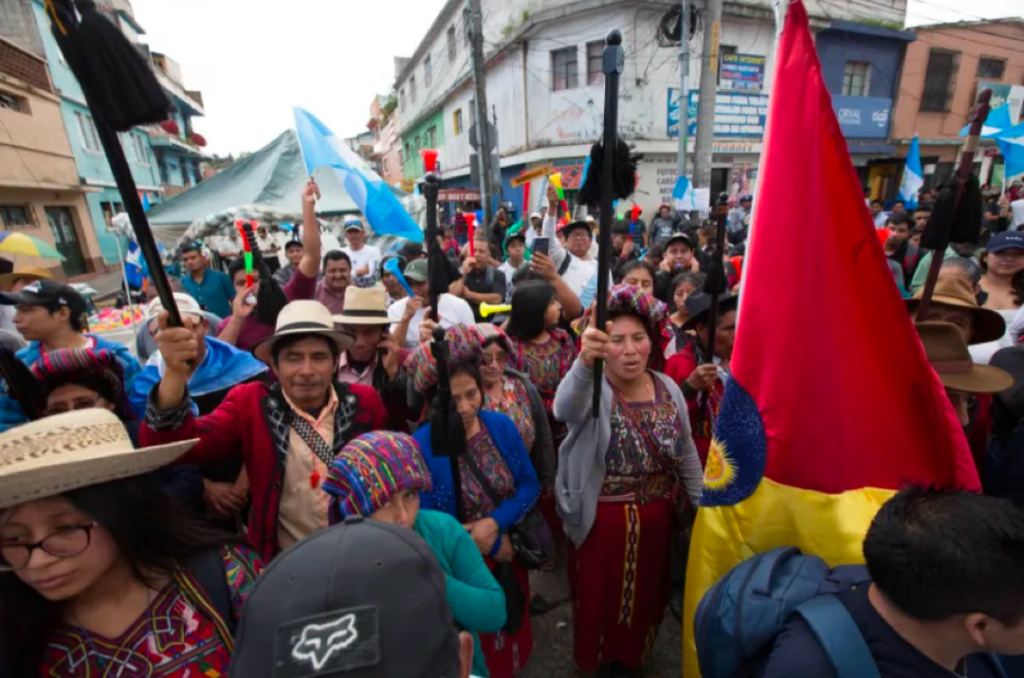
Photo by: Aljazeera.com
[1] Actions such as the seizure of the records of the first round of elections, in the raid carried out by the Special Prosecutor’s Office against Impunity (FECI) at the headquarters of the Supreme Electoral Tribunal on September 29th, and the renewal for the fourth consecutive year of magistrates of the Supreme Court of Justice, on October 13th, despite the fact that their term of office ended in 2019 and several of them have been accused by the population of undermining justice; are recent examples of decades of a system of oppression that have compelled the population of Guatemala to claim through various expressions within the country and outside it, respect for democracy.
[2] The Ancestral Authorities of the 48 cantons, land-defense organizations, organizations for historical memory, truth and justice, and community leaders, have demonstrated peacefully outside the Public Prosecutor’s Office in Guatemala City and at different points nationwide in an Indefinite National Strike since October 2nd. During the strike, sectors of society such as teachers, market vendors, artists, doctors, unions, students, transport workers, cyclists, diaspora, among others, have joined together to continue the demonstrations through care and dialogue, in order to resist confrontations.
[3] Despite the efforts of the Ancestral Authorities to dialogue with government institutions, and the appeals legally presented to the Constitutional Court, the government’s response has been repression. Since the beginning of the strike, the government has sent police and military forces to try to dissolve the demonstrations, using the resolution of the Constitutional Court that ordered “to reestablish free movement, using public force if necessary.” In spite of this, the people remain firm in their struggle for a free Guatemala, beyond the defense of democracy during an electoral period.
[4] Finally, on October 13th, President Giammattei agreed to meet with the Ancestral Authorities. During this meeting it became evident the lack of political will on Giammattei’s part to remove the officials that have perpetuated the state of corruption in the country. Therefore, the Ancestral Authorities and the people who support them will remain in an indefinite strike in a peaceful manner.
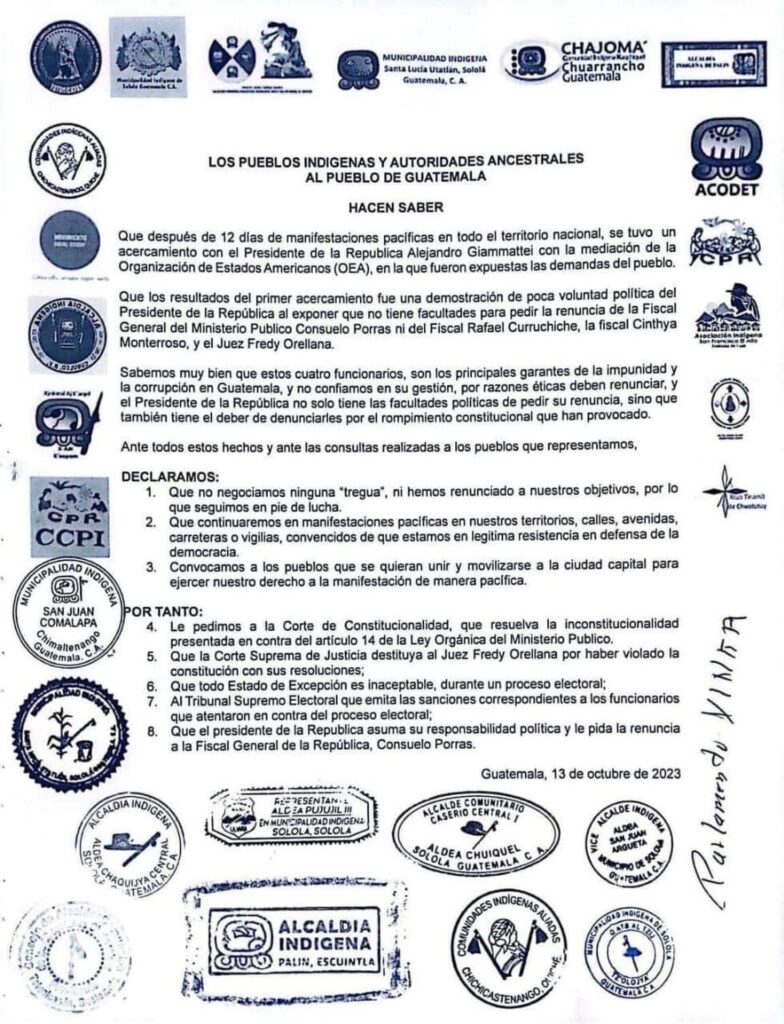
Statement from Ancestral Authorities to the People of Guatemala, October 13th, 2023
[5] In the following days, the attacks against the peaceful demonstrations of the people have intensified every day, coming from paramilitary groups and drug traffickers who with their weapons are threatening not only the right to demonstrate, but the very lives of the protesters, as well as increasing the amount of false and criminalizing news that seek to delegitimize the struggles.
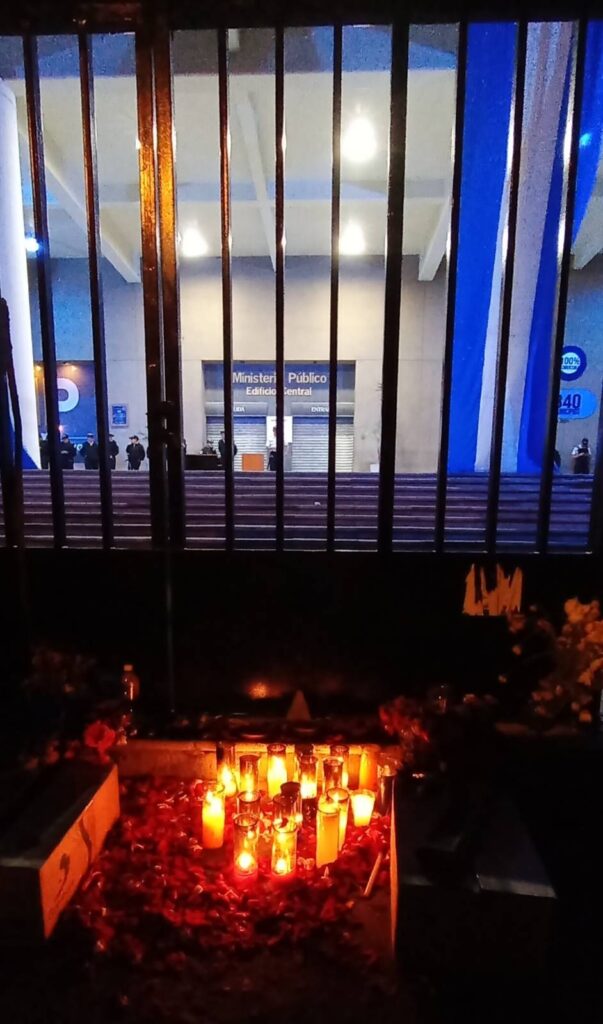
Photo by NISGUA. Sacred altar in front of the Public Ministry in Guatemala City
[6] The first week of October, president-elect Bernardo Arévalo traveled to the United States to lobby in support of democracy in Guatemala. During his trip he met with different actors, such as the Organization of American States (OAS), Secretary of State Antony Blinken, USAID Administrator Samantha Power, and the Wilson Center think-tank. The president-elect is in a complex position. He needs a short-term alliance with actors in the U.S. government to resist the onslaught of the Pact of Corruption in Guatemala. At the same time, this is a short-term solution because US and Guatemalan interests will not always coincide, and ultimately the long-term interests of the US are not the same as those of the people in struggle.
[7] Bernardo Arévalo, as president-elect, urged the current president Giammattei, within his approximately 90 days as President, to use legal measures to denounce the illegal and spurious actions of the corrupt officials of the Public Prosecutor’s Office. Our partners ask that president-elect Arévalo, who now more than ever must maintain his congruence with the people of Guatemala, ensure that at the moment of initiating his mandate “the Indigenous peoples must be part of the democratic spring,” and therefore not allow the establishment of political agendas of foreign governments, such as the United States, whose capitalist and imperialist policies impact in a regressive manner the respect of the rights of Indigenous Peoples in Guatemala and worldwide.
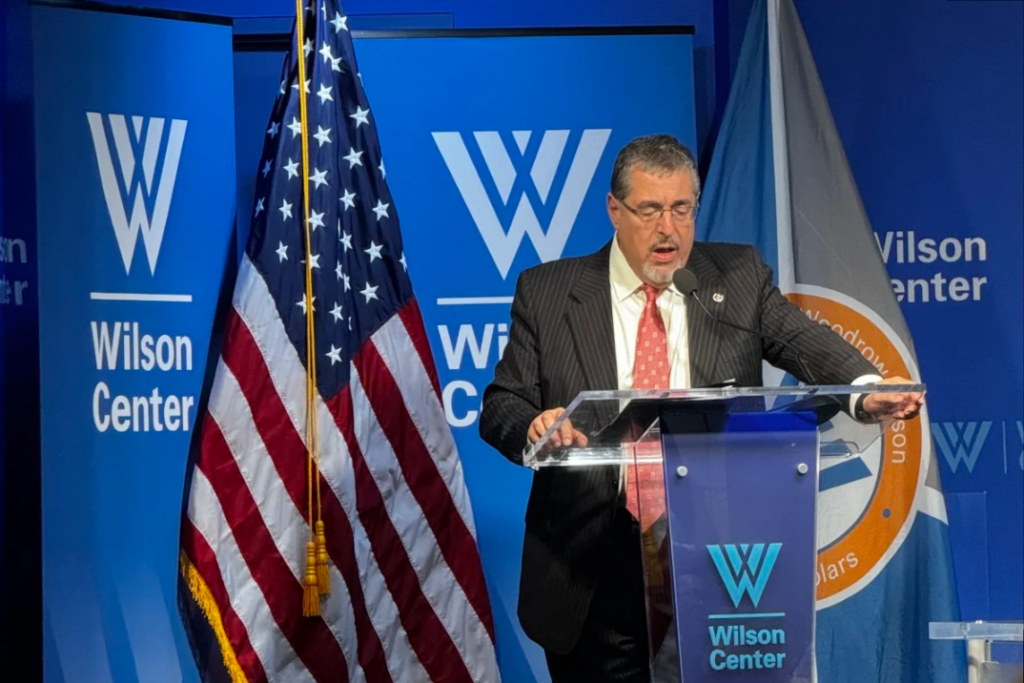
Photo by: Igor Patrick / www.scmp.com. Guatemala’s president-elect Bernardo Arévalo addresses an event at the Wilson Centre in Washington.
[8] The unity of the Guatemalan people has transcended its territory, the Guatemalan diaspora has joined these demonstrations by protesting in front of the embassies abroad. For many of them, the current situation of the country is a reflection of what once triggered their departure, exile and/or forced displacement, so no matter where they are, their heart is firm towards the liberation of their people.
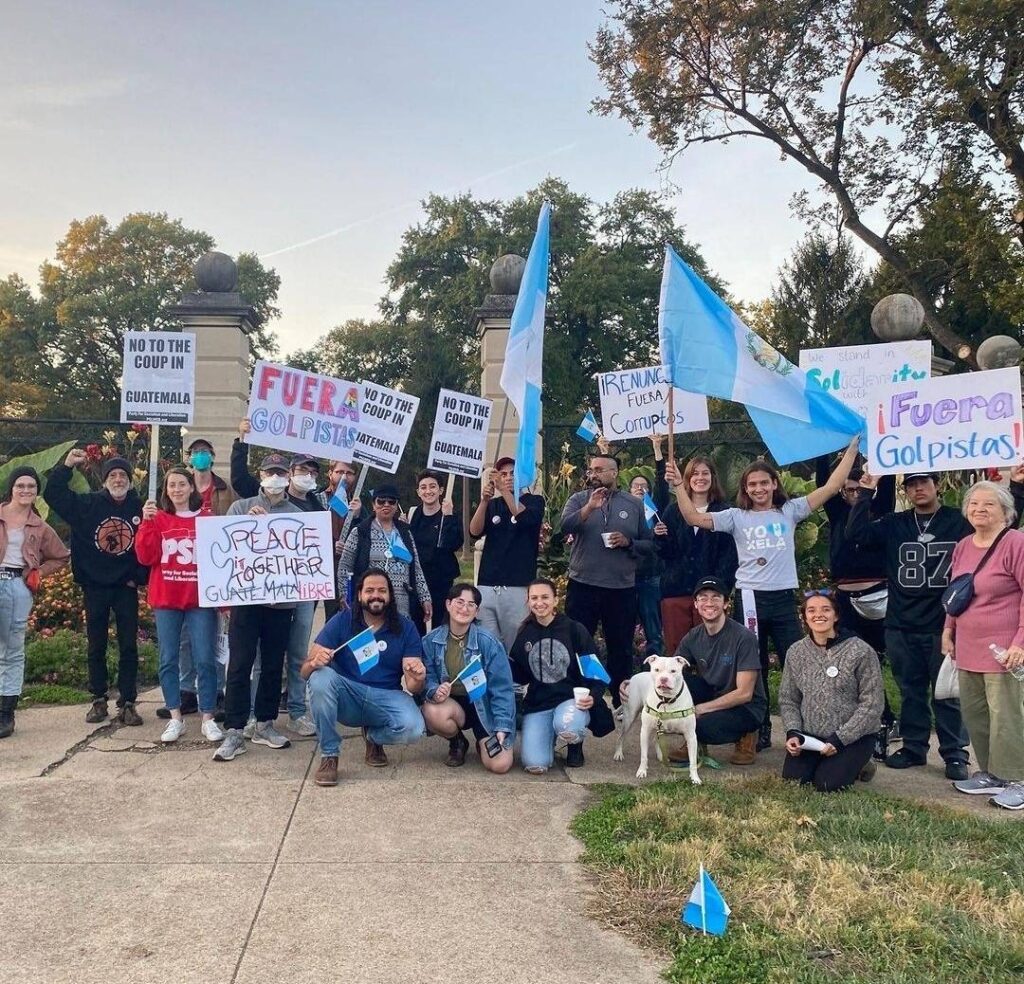
Photo and solidarity action by: IFCLA – St. Louis Inter-Faith Committee on Latin America. International solidarity with the historic and popular pro-democracy and anti-corruption protest in Guatemala from Saint Louis, Missouri.
[9] On October 18th, the Constitutional Court gave 6 hours for the peaceful protest on the footsteps of the Public Ministry to leave the space willingly, or be removed forcefully. The primary argument by the government was that the protest obstructed access to the building. In light of this, a space for dialogue and negotiation was created between the Minister of the Interior, the Human Rights Ombudsman’s Office, the National Civil Police and the Ancestral Authorities. The latter convincingly demonstrated that the protest at the Public Ministry is peaceful and that it is not obstructing access to that institution. This left the governmental authorities, who have lashed out against the right to peaceful demonstration, without real arguments. As of today, October 19th, the 18th day of the national strike, the peaceful protest in front of the Public Ministry continues.
[10] Although for centuries Indigenous Peoples have survived policies of extermination and state abandonment, their history of resistance and struggle has also prevailed, as it did on October 20, 1944 in the famous “October Revolution.” And they are doing so again. After 18 days of peaceful demonstrations, thousands of people from many sectors (indigenous communities and organizations, student groups, religious groups, unions, human rights organizations, and many more) are gathering in the Capital City to once again raise their voices on this October 20th, 2023, in a clear call demanding respect for democracy, the right to demonstrate, and an end to impunity and corruption within the state institutions of Guatemala.
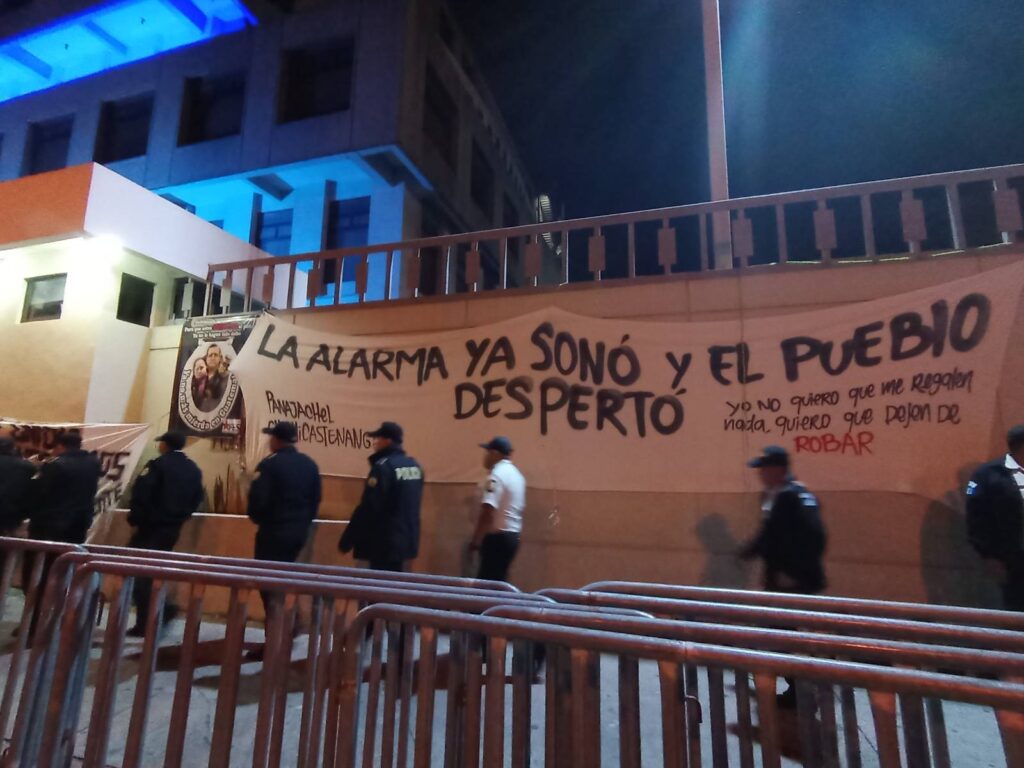
Photo by: NISGUA. At the front of the Public Ministry
(1) “Corrupt Pact” (in Spanish “Pacto de Corruptos”) is a term used in Guatemala to refer to politicians, businessmen, organized crime and members of the judicial system accused of acts of corruption and who maintain a system of impunity that protects them from prosecution and maintain their political and economic control at the expense of the majority of the population.



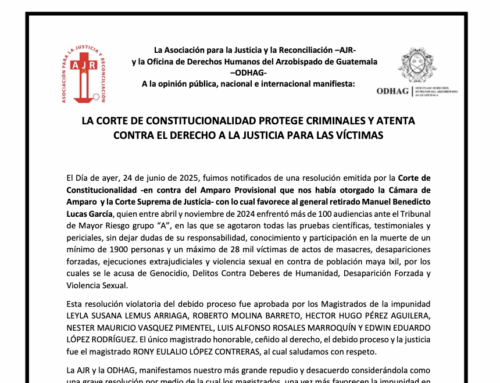
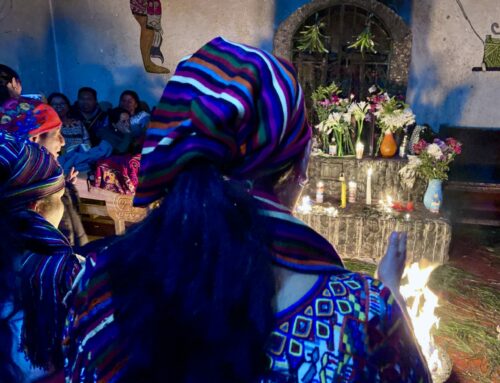
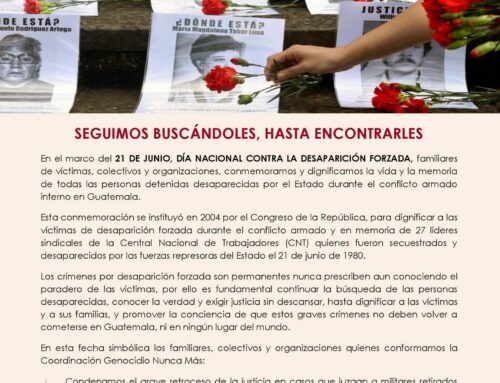
Leave A Comment